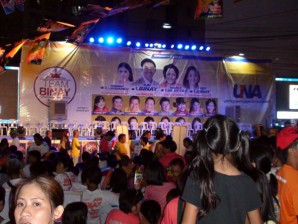SC ruling on air time limit bad for UNA candidates

Speaking to reporters at the sidelines of the United Nationalist Alliance’s (UNA) mini rally in Villasis, Pangasinan, Senator Gregorio Honasan said that while Brillantes’ resignation would cause “instability” in the poll body’s processes, he felt that such a scenario would not derail Comelec’s goals.
“Chairman Brillantes is under a lot of pressure but a decision from the good chairman to resign will not affect the objective to hold clean, credible and honest elections,” said the senator.
Brillantes mulled the idea of stepping down from his post as Comelec chairman after the Supreme Court issued a status quo ante order on the Comelec resolution which imposed limits on the air time candidates were allowed to have during the campaign period.
The Comelec resolution allowed national candidates to acquire 120 minutes of air time for television and 180 minutes for radio while local candidates were allowed 60 minutes-worth of exposure for television and 90 minutes for radio.
The decision to step down as poll chief was up to Brillantes but Honasan said he hoped the Comelec chairman’s threat of resignation would not push through.
Article continues after this advertisementBut whatever decision Brillantes came up with in the end, the senator said that the Comelec “will function… will survive even with the worst case scenario of the resignation of Chairman Brillantes.”
Article continues after this advertisementThe Supreme Court ruling “confused” Cagayan Representative Jack Enrile who told reporters that the Comelec should have a clear set of rules once the campaign period begins.
Changing the rules of the game in the middle of the campaign period was forcing the opposition to “rethink our strategies due to our limited resources,” he said.
Honasan said that the high tribunal’s decision should have come earlier, specifically “before the campaign period.”
“Now we are looking at the consequences of the lack of proactive policies,” he said.
Despite “being at a crossroads and at a quandary as to how to raise additional funds to keep up with moneyed candidates,” Enrile said that they would be sticking to their initial media plan.
“We will stick to our media plan, to our budget, and hope for the best. Our budget was based on the 120 minutes of television (advertisements) and 180 minutes on radio–it means more sorties, more Internet presence,” said the Cagayan lawmaker.
Bayan Muna Representative Teddy Casino has earlier lambasted the Supreme Court decision as being advantageous only for moneyed candidates but Honasan felt that whether the high tribunal stood by its SQA or decides to reverse the said ruling “either way it will have no impact on e candidates in the sense that our time is limited. (We have) less than a month (left to campaign).”
Fellow UNA candidate Zambales Representative Mitos Magsaysay said that even with her own campaign advertisement she has only used up five minutes of the allowed 120 minutes for television exposure.
She said that the high court’s SQA on Comelec’s resolution on limiting airtime would only benefit administration candidates as they had better access to funding.
“Let’s face it, history shows that if you’re an administration candidate, you gain access to more endorsements. This is an opportunity for Team PNoy because they have more funds,” she said.
Magsaysay saw a “subliminal message” being sent by Team PNoy to businessmen on earning “the ire of the administration knowing that the BIR, Customs and other agencies can harass you.”
But limited resources were preferable if these meant being independent should she win in the senatorial race, said the Zambales legislator who speculated that candidates who sourced funds from large companies would be beholden to those they owed after the elections.
“At least, I will not owe anyone once the elections are over,” she said, adding that she could not say the same for other Senate aspirants.
“You cannot bite the hand that feeds you,” said Magsaysay.
Personally, Honasan said that the SQA did not affect him since his capability to go into television advertisements and commercials was already limited.
Aside from the opposition’s common campaign advertisements, Honasan has not released his own television or radio ad and like Magsaysay, he has only used five minutes of the 120-minute limit initially set by the poll body.